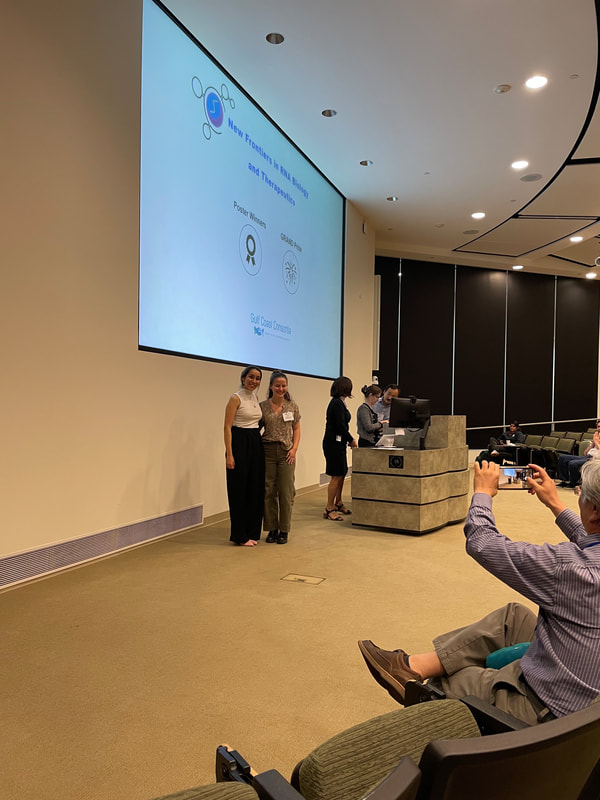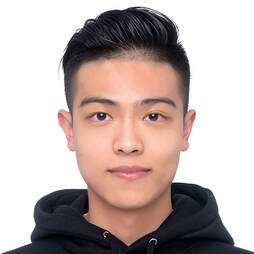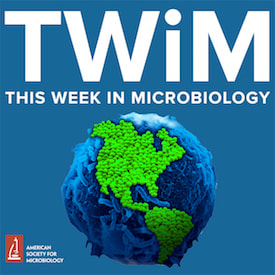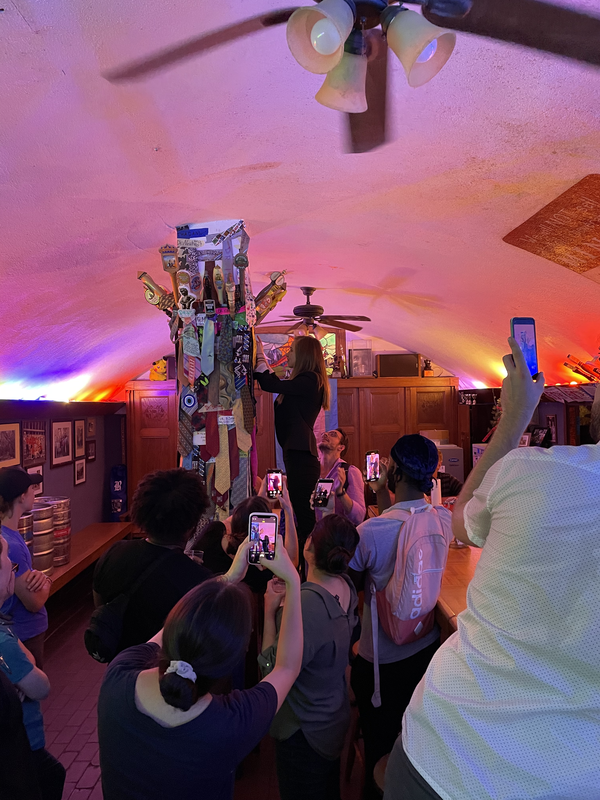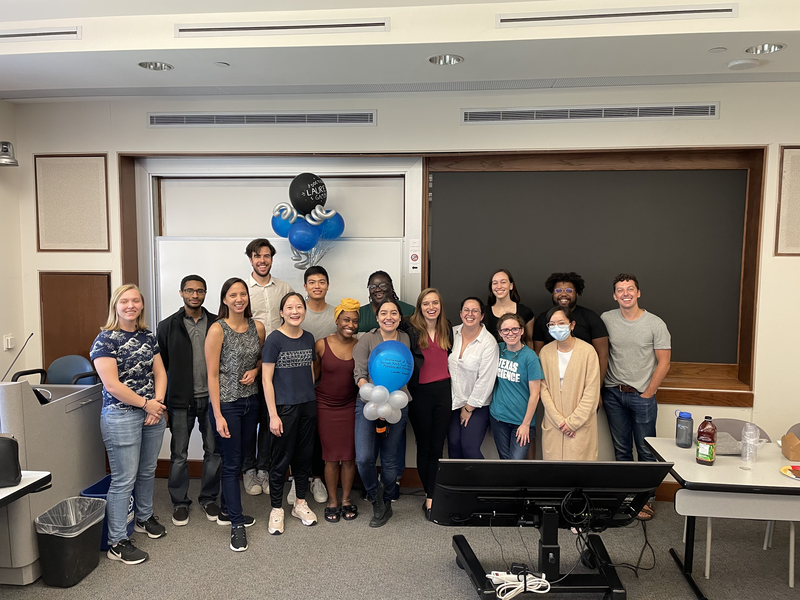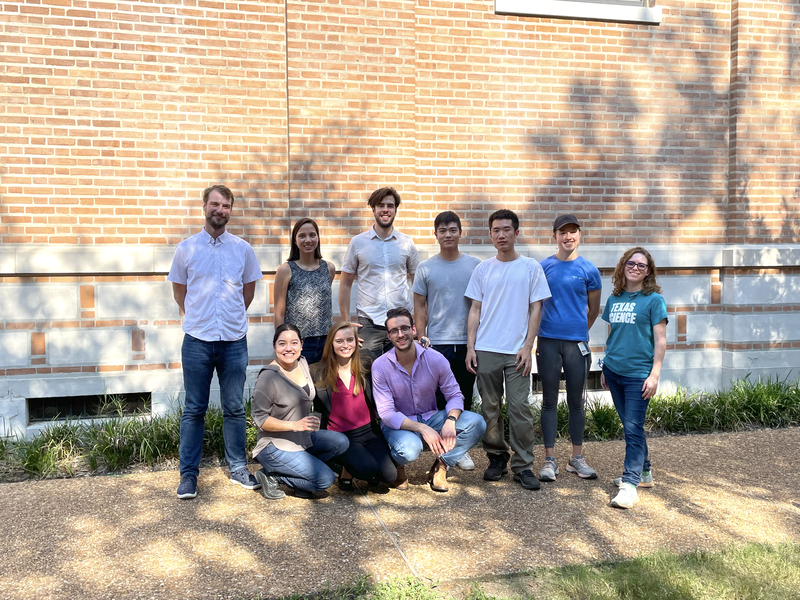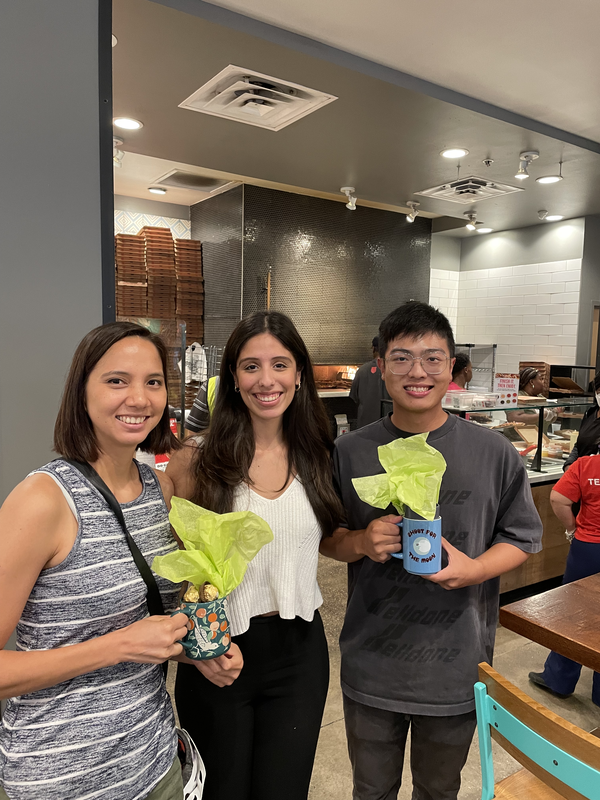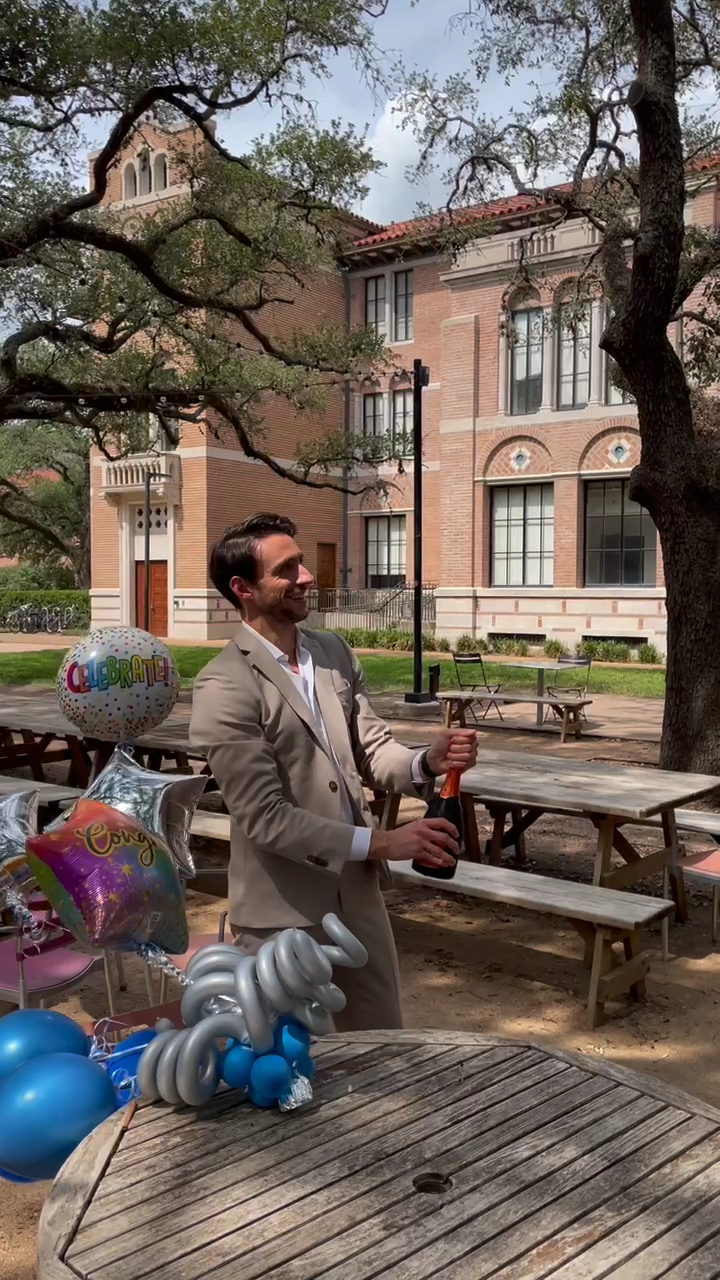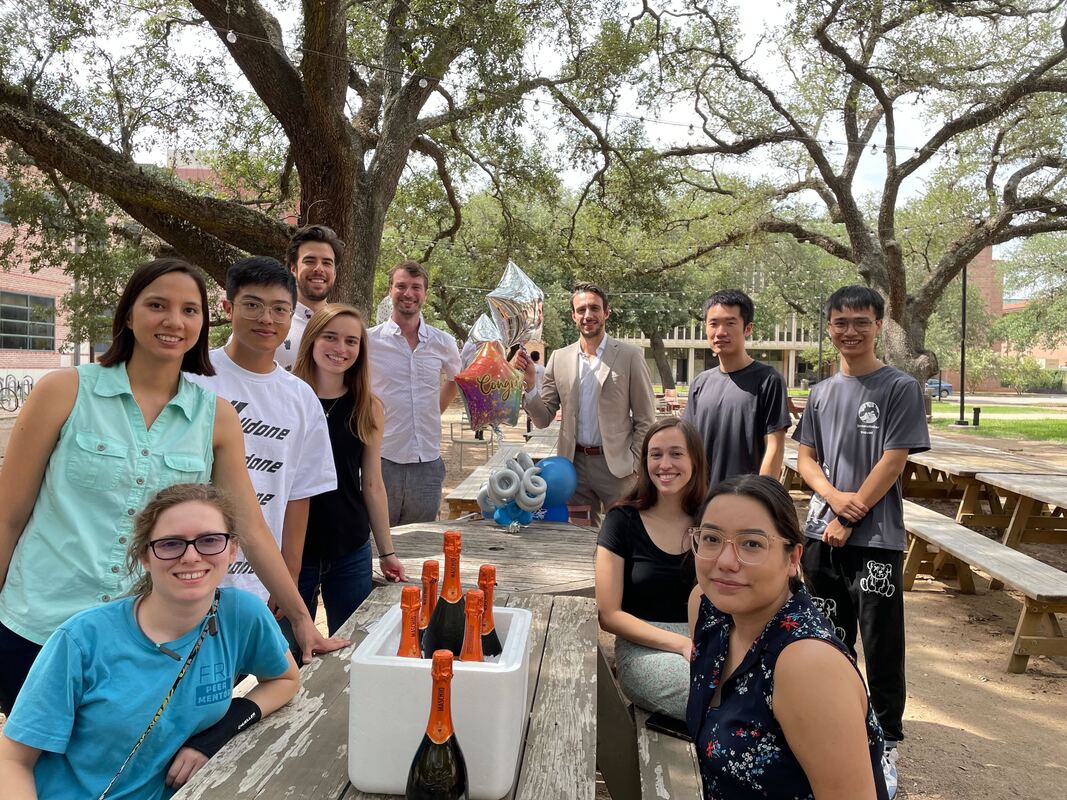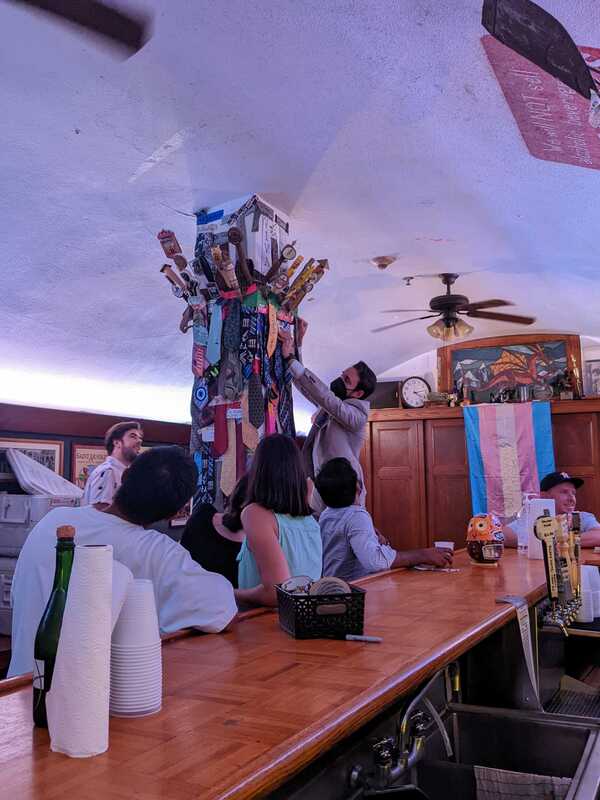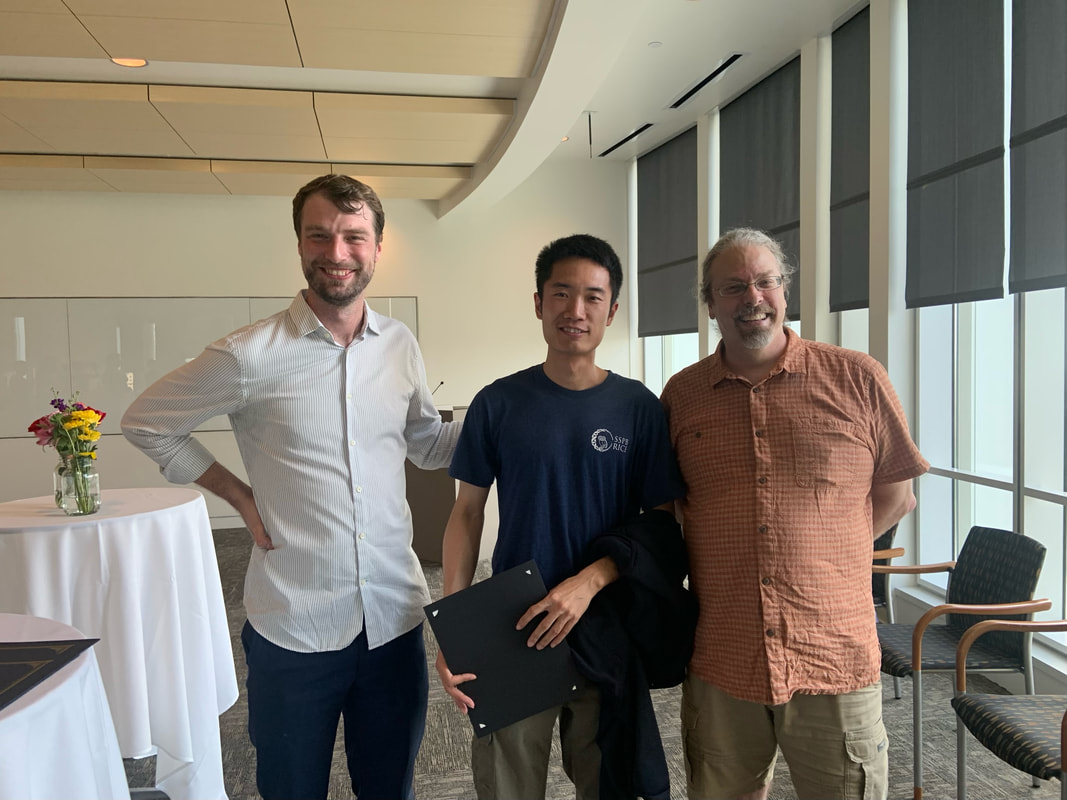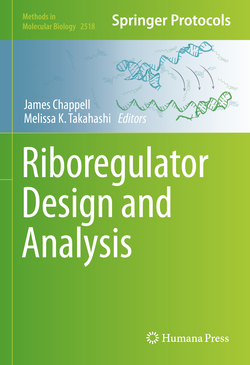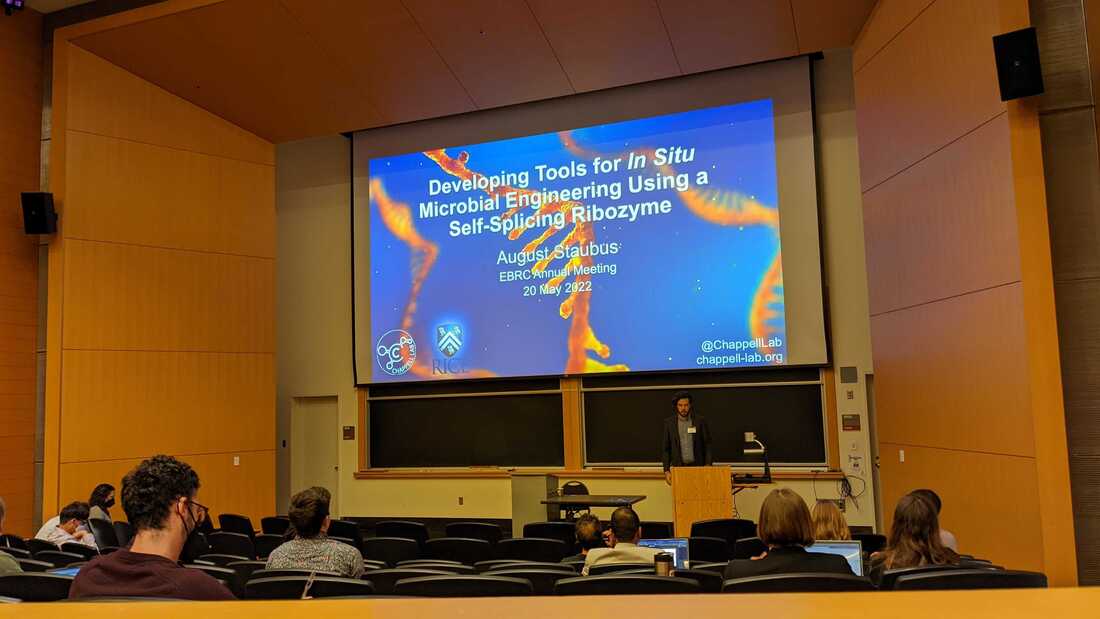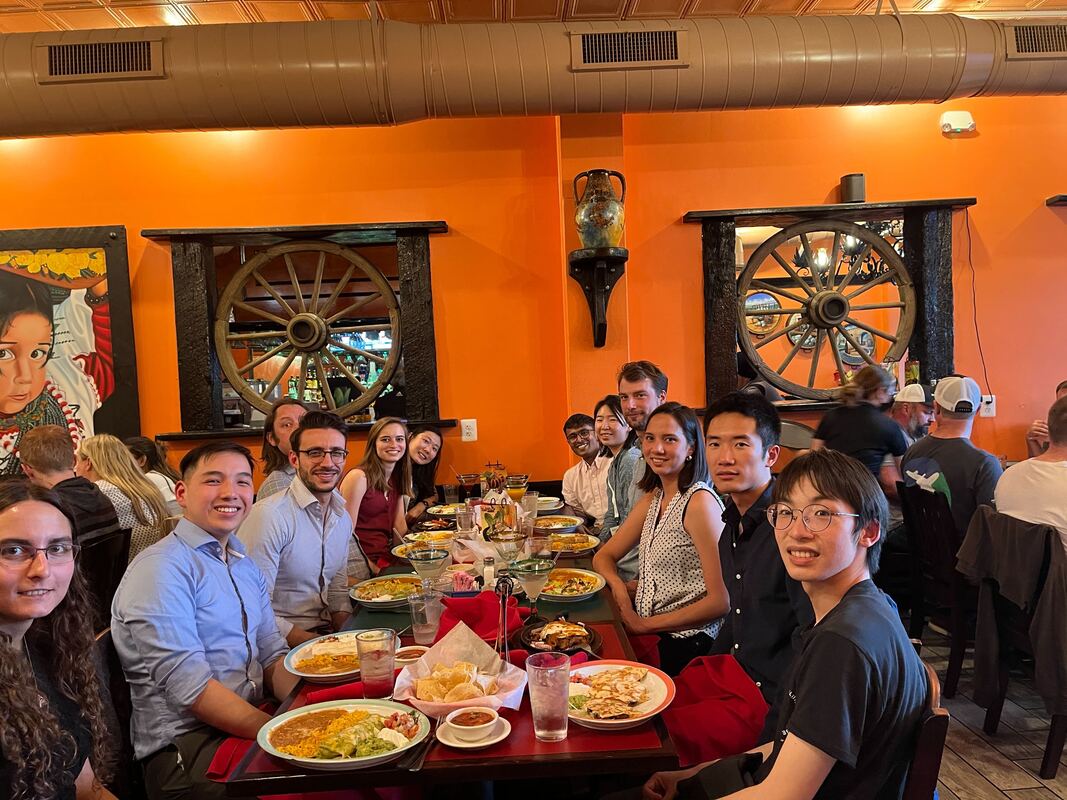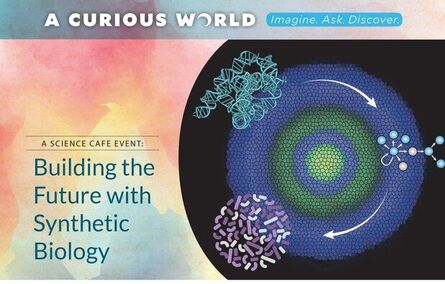|
Our paper on using CRISPR-Associated Transposon (CAST) as a gene activation tool is online! In this work, we adapt a CAST system to achieve tunable activation, activate endogenous genes, and to synthetically induce ampicillin-resistant phenotypes in E. coli.
https://pubs.acs.org/action/showCitFormats?doi=10.1021/acssynbio.3c00563&ref=pdf Big congrats to Elise Zimmerman on winning best poster prize at the Keck annual conference. This years conference theme was RNA therapeutics and Elise presented their work on RNA antimicrobials.
Check out our latest paper describing a novel 'RNA array design strategy' for creating tunable RNA circuits that function across different microbes! A big congrats to Baiyang Liu who led the work and our collaborators
https://www.nature.com/articles/s41467-023-40785-x Hugely honored to announce that we received an NSF CAREER award. The proposal will build on several RNA technologies to establish a new framework for programming microbial consortia. Rice News wrote a really nice piece about the work, which you can find on this link.
Delighted to announce we have been awarded a $1.5 mill Kleberg Foundation grant to support our work developing RNA therapeutics along with our collaborators Dr Silberg (Rice U) and Dr. Pablo Okhuysen (MD Anderson). Really excited about this project and hope to share our developments later in the year.
You can find a nice news article about the project and award on the link below: "Rice labs seek RNA programming for ‘smart’ antibiotics" Super excited to share our latest work on RENDR — a modular platform to convert cellular RNA into orthogonal protein outputs. This has been a really interest project and involved a lot of method innovation for RNA engineering! Our long-term goal is to use this type of technology to create new types of genetic elements that can sense host information, for example, if a host cell is diseased or infected. Really proud of the team, especially Dr. Lauren Gambill the first author of the work. Check out the paper here — https://www.nature.com/articles/s41467-023-36073-3
Malyn, Andrea, and James headed to the Texas branch of the ASM meeting this week. Huge congratulations to Malyn and Drew who both picked up poster presentations prizes:
Hugely honored to be awarded a collaborative NSF proposal investigating new forms of biological memory. This work will be performed alongside a team of amazing researchers at Rice from the Silberg, Ajo-Franklin, and Verduzco groups. You can read a Rice news article about this funding here and see the proposal abstract here.
Huge congratulations to Maria Claudia on defending their thesis! Maria Claudia was a founding member of the lab and pioneered our innovations on CRISPR-Cas regulatory systems. Maria Claudia will post-doc with us to continue some exciting work on engineered RNA systems.
Huge congratulations to Robin who won the 2022-23 Diana McSherry and Patrick Poe Research Award! For 2022-23, the award called for proposals from projects in evolution and evolutionary biology, particularly experiments that shed light on a theoretical process; or projects that study the evolution or structure of RNAs or that are trying to engineer specific functions into RNA molecules for synthetic biology. Robin was won this award for their creative project focused on RNA engineering.
Huge honor to be featured on the podcast "this week in microbiology". One our lab's favorite podcasts and it is a great privilege to be featured. Specifically, Andrea's, Macla's, and Katherine's paper on activating natural products in Streptomyces using CRISPR-Cas tools was discussed. If interested you can listen to the episode on the link below, and find our open access paper here.
https://asm.org/Podcasts/TWiM/Episodes/Metabolism-s-Got-Rhythm-TWiM-272 Huge congratulations to Lauren on defending her PhD! Lauren was one of the pioneers of the lab and her work was critical in establishing us in some new areas of research and directions which have become mainstay areas of the lab. Beyond this Lauren was really critical in establishing the lab and its culture. We wish Lauren all the best in her new adventures!
This summer, we were delighted to host Angela Pinon, Yves-Langston Mays, and Rodolfo Gutiérrez-García in our lab for some very exciting research as part of various Research Experiences for Undergraduates. Angela joined as part of the Bionetworks REU and Yves came from the NEWT REU. Huge thanks to Macla and Robin for their mentorship over the summer (Photo below of Macla, Robin, and Angela)
Last but not least, Rodolfo continued his project in the lab with support from the Biosciences Summer Research Institute, showing his progress in his poster, "Establishment of bioprospecting pipeline for novel antibiotics through Streptomyces isolation from gall-forming wasps." Huge thanks to Drew for their mentorship over the summer. Introducing ...(drum roll)...Dr. Ameruoso who successfully defended his Ph.D.!!! Andrea joined the lab as our first official graduate student at the end of 2017. He pioneered the laboratories efforts to genetically program Streptomyces for natural product discovery. As a founding member of the lab, he has been instrumental in establishing the lab and we wish him all the best in his future endeavors!
As is tradition for newly minted graduate students at Rice, Andrea took part in a tie-cutting ceremony (bottom photo), the remains of which you will find pinned up in the valhalla bar at Rice. Our paper on using CRISPR-Cas tools in Streptomyces to activate silent natural products is out!7/15/2022
Bacteria can synthesize a staggering repertoire of complex chemical molecules with valuable properties. While a large repertoire of uncharacterized natural products exists, a critical barrier to their discovery is that bacteria do not synthesize these chemicals when grown in the laboratory. In our latest publication in NAR, we created new synthetic transcription factors based upon CRISPR-Cas systems that can be used to reprogram cells into natural product synthesizing phenotypes.
Congrats to Baiyang for winning the 2022 SSPB Research Award! This award recognizes and honors graduate students for outstanding doctoral research as marked by a first-author publication.
Great to have our methods in molecular biology book out on riboregulator design and analysis! Was really great fun to work with Melissa Takahashi (https://takahashi-lab.org/) on editing this book — an amazing scientist and former colleague. Also lots of thanks to all the chapter contributions from leading RNA biologists and engineers! Really happy with how the edition turned out!
Great to contribute to the EBRC annual meeting 2022. August presented our work on engineering ribozymes for microbiome engineering applications. Second in-person conference of the year!
Andrea, Macla, Lauren, Baiyang, and James headed to SEED 2022 in DC. This was the first in-person conference for many of us in a long time and it was awesome to get a chance to catch up with old friends and make some new ones. A particular highlight — margaritas and tacos with the Lucks lab!
We want to welcome to the lab Robin Mo and Malyn Selinidis from the Biochemistry and Cell Biology Graduate Program, and Ashley Robinson from the Systems, Synthetic, and Physical Biology Graduate Program.
We look forward to having you in the lab! Great evening at Rice Natural Science Science Cafe event. Science cafe is an open to the public science event talking about the latest developments in science and what will be possible in the future. Was really great to present alongside two of my favorite synthetic biologists (Matt Bennett and Joff Silberg).
Cientificos.pe is a non-profit organization that aims to support upcoming and current Peruvian scientists. They recently featured our very own Maria Villegas Kcam, who grew up in Piura, Peru. To see the full thread, click the link below!
Translation: "Good morning science lovers! For our #peruvianpaper and scientific profile of this week, we want to share an article published in @NAR_Open by @MaClaVK #PeruScience"
This past weekend, the lab travelled to Northwestern University to attend the Central US Synthetic Biology Workshop. We were proud to present our research during the poster sessions and lightning talks:
The conference included a great keynote speech given by Rice's own, Dr. Caroline Ajo-Franklin, along with other fascinating talks on cutting-edge synthetic biology research. We hope to be back next year! Cells can be programmed to sense infectious agents and, in response, actuate biomolecular programs to alert, protect the host, or destroy the pathogenic target. Engineering cells in this manner would provide a transformative approach to address the threat of emerging viral diseases. The Chappell lab hopes to contribute to these efforts. In a collaborative effort the Chappell and Segatori labs were awarded a National Science Foundation (NSF) grant to develop a novel RNA detection platform for programming cells. We are very excited to contribute to these efforts by NSF!
The ability of cells to reliably replicate and maintain genomic information is a key facet of life. Recapitulating these mechanisms is a critical step towards the development of autonomous synthetic cells that exhibit self-replication and stable propagation of their genetic information. The Chappell Lab hopes to address this. In a collaborative effort the Chappell, Lakin, Davenport, and Frow labs were awarded a National Science Foundation (NSF) grant to develop a synthetic DNA replication control system. We are very excited to contribute to the grand challenging of constructing a synthetic cell and understanding the rules of life !
|
CONTACT US
|
MAIL:
Chappell Lab George R. Brown Hall W200i 6100 Main St. Houston TX 77005-1892 |
PHONE:
+1 (713) 348-3781 |

